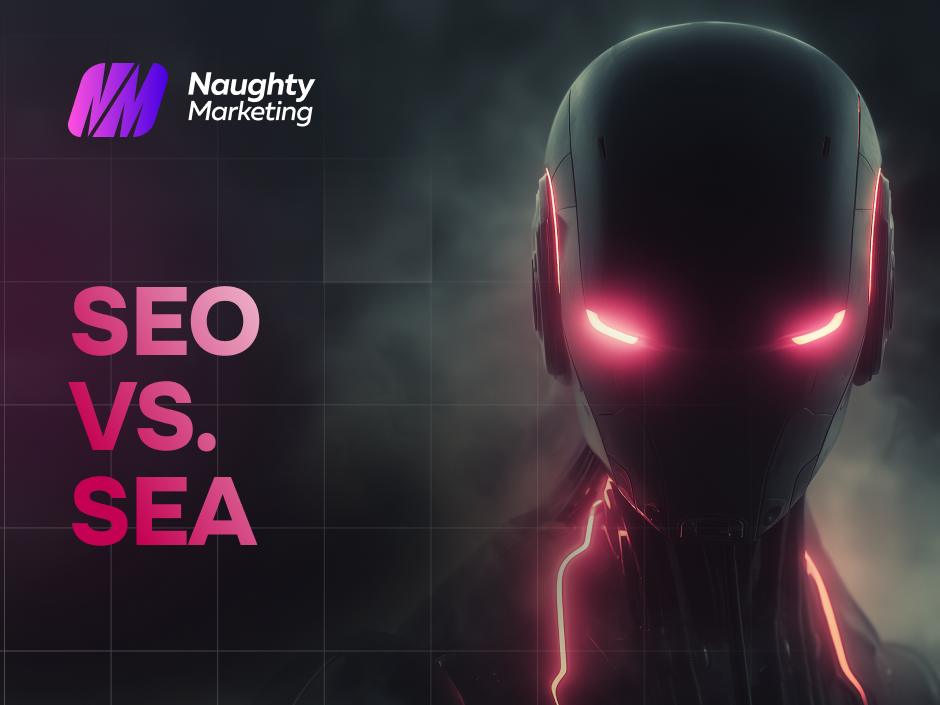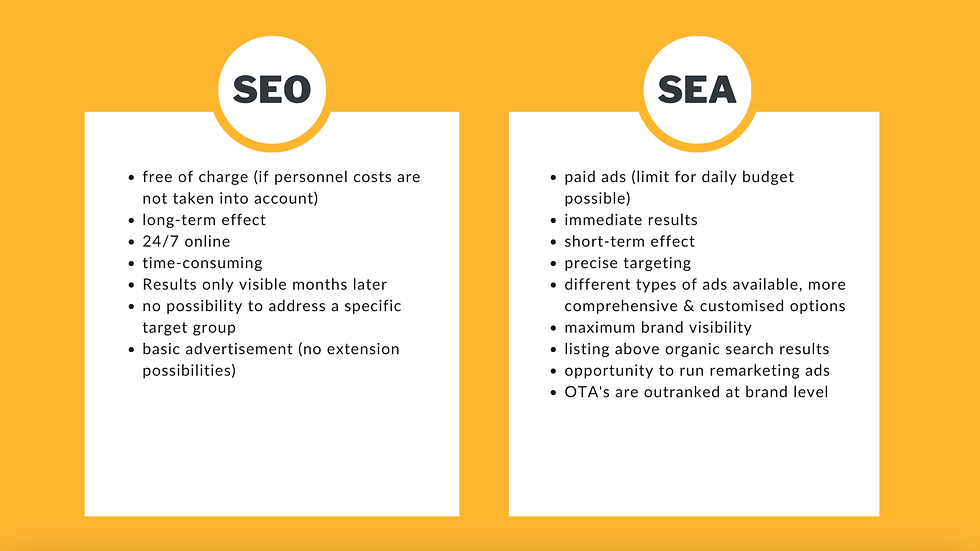SEO vs. SEA: Choosing the Right Strategy for Your Project's Success
- Slava Jefremov
- Jul 31, 2025
- 5 min read
Updated: Dec 15, 2025

Introduction
In the fast-paced digital marketing world, establishing a robust online presence is critical, especially for B2B fintech companies operating in highly competitive markets. Central to any effective digital marketing strategy are two powerful acronyms: SEO and SEA.
Understanding the SEO vs SEA dynamic is fundamental to success. This guide will explore Search Engine Optimization (SEO) and Search Engine Advertising (SEA), explaining how they work to enhance online visibility on search engines like Google and drive different types of website traffic.
Key Takeaways
SEO Search Engine Optimization is the practice of refining your website to rank higher in the organic search results. It’s a long term strategy designed to build brand authority and generate sustainable traffic.
SEA Search Engine Advertising is the practice of paying for ad placements in search results. These paid ads, often managed through platforms like Google Ads, offer immediate results and rapid visibility.
The primary distinction lies in cost and speed. An effective SEO strategy earns you clicks on unpaid search results, while a SEA strategy involves paying for traffic through paid advertising.
The most successful strategies don't treat this as a zero-sum game. The goal is to combine SEO and SEA, using both SEO tactics and paid tactics to dominate the search engine results pages (SERPs).
What is SEO?
Search Engine Optimization, or SEO, is a meticulous process of making your website more appealing to the search engine algorithm. The primary objective of any SEO campaign is to improve your site's organic rankings for relevant keywords, which in turn drives high-quality organic traffic to your digital doorstep and increases your overall organic visibility.
Importance of SEO in Fintech
In the fintech sector, where trust is a non-negotiable currency, a strong company's seo strategy is invaluable. High organic rankings on search engines signal authority and credibility to potential customers. When a business decision-maker conducts an organic search for a financial solution, seeing your firm in the top organic search engine results builds confidence. This is crucial for establishing a sustainable online presence.
Benefits of SEO for Businesses
Long-Term Credibility: Unlike SEA, the results from SEO optimization are lasting. Strong organic results build trust and can provide a steady stream of leads.
Cost-Effectiveness: Over time, SEO can yield a higher ROI as you aren't paying for every click. The focus is on earning clicks from the organic search results.
Improved User Experience: The process of SEO often involves technical optimization, such as improving site speed and mobile-friendliness, which benefits every visitor.
Driving Targeted Traffic: By focusing your SEO strategy on specific keywords your target audience is using, you attract users actively seeking your fintech solutions.
SEO Strategies
A comprehensive SEO strategy is multi-faceted. It begins with thorough keyword research to identify the right keywords and search terms your audience uses. This is followed by on-page SEO optimization, which involves creating relevant content and optimizing page elements. Off-page strategies, like building backlinks from other websites, and ongoing technical optimization are also critical components for improving your position on the search results page.

What is SEA?
Search Engine Advertising (SEA), a core component of search engine marketing (SEM), involves paying for your website to appear in the sponsored sections of the search results. Advertisers run SEA campaigns by bidding on keywords, and when a user clicks their ad, they pay a fee.
Importance of SEA in Fintech
For fintech companies that need quick visibility, SEA is indispensable. It allows you to generate traffic almost instantly and promote new products or short term campaigns with incredible precision. This form of paid advertising is a powerful way to get in front of a specific target audience with a time-sensitive offer.
Benefits of SEA for Businesses
Immediate Results: As soon as your Google Ads account is set up and your campaign is approved, your paid ads can start appearing in paid search results, driving more traffic immediately.
Precise Targeting: SEA platforms offer granular precise targeting options, allowing you to reach potential customers based on demographics, interests, and online behavior.
Measurability and Control: With tools like Google Analytics and built-in conversion tracking, you can monitor performance in real-time, get valuable SEA data, and optimize for a better return.
Brand Awareness: Even if users don't click, seeing your brand at the top of the search engine results helps increase brand awareness.
SEA Strategies
An effective SEA strategy involves more than just bidding. You must write compelling ad copy that highlights your unique selling points and conduct meticulous keyword research to target specific keywords that signal commercial intent. Optimizing landing pages is also crucial to ensure that the traffic you pay for has a high chance of converting.
SEO vs SEA: The Differences
The debate of SEO vs SEA is best understood by comparing their core attributes. While both SEO and SEA aim for visibility on the search results page, their methods and timelines differ significantly.
Feature | SEO (Search Engine Optimization) | SEA (Search Engine Advertising) |
Cost | Investment in resources (content, technical expertise) | Direct cost-per-click (PPC) budget |
Speed | Long-term; SEO results can take months | Immediate results and rapid visibility |
Longevity | Builds sustainable traffic and a lasting presence | Traffic stops when you pause the paid advertising campaign |
Position | In the unpaid search results / organic results | At the top and bottom of the SERP as paid ads |
Role in a Holistic Marketing Strategy
In today's online marketing landscape, especially in highly competitive industries like fintech, the most effective approach is to combine SEO and SEA. They should not be viewed as mutually exclusive. For instance, leveraging SEA data can provide valuable insights into your SEO efforts. By analyzing your SEA campaigns, you can discover which keywords convert best and then build your relevant content strategy around those terms.
This synergy ensures you capture your target audience at every stage of their journey, driving both organic traffic and paid conversions. This integrated approach, often more powerful than just running social media advertising alone, creates a comprehensive digital footprint.
Conclusion
Understanding the nuances of SEO and SEA is essential for any B2B fintech marketer. Search Engine Optimization builds the foundation for long-term credibility and a sustainable online presence, while Search Engine Advertising provides the agility for short term campaigns and quick visibility. By implementing robust SEO and SEA strategies, your fintech company can dominate the search engine results, generate traffic from multiple avenues, and achieve its overarching business goals.
Frequently Asked Questions
Which is better for a new fintech startup: SEO or SEA?
A new startup often benefits most from using both. SEA campaigns can deliver the immediate results and initial stream of potential customers needed for early growth. Concurrently, focusing on the company's SEO strategy as a long term strategy will build the foundation for future organic growth.
How do I know which keywords to target?
Effective keyword research is key for both. For your SEO campaign, you'll want to target a mix of informational and commercial search terms. For SEA, you can use your Google Ads account to test different keywords and see which ones drive the most conversions, providing actionable SEA data.
How do SEO and SEA really work together?
They work together to maximize your online visibility. You can target specific keywords with paid ads while also working to rank for them organically. Furthermore, insights from your paid search results, such as high-performing ad copy, can inform the titles and descriptions you use in the organic search engine results.
Can I manage this myself or do I need an agency?
While it's possible to manage your own online marketing, both SEO and SEA require significant expertise. SEO involves deep technical optimization and content planning. SEA requires constant monitoring and budget management. For businesses in highly competitive markets, partnering with a specialized agency is often more effective.
How are results measured?
SEO results are typically measured over months using metrics like organic rankings, organic traffic, and organic lead generation, tracked in Google Analytics. SEA performance is measured by metrics like click-through rate (CTR), cost-per-click (CPC), and conversion rate, with conversion tracking providing clear ROI data.



Comments